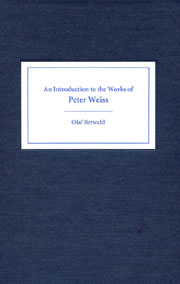Book contents
- Frontmatter
- Contents
- Acknowledgments
- Introduction
- 1 Subversive Slapstick: The Early Plays Der Turm, Die Versicherung, Nacht mit Gästen, and Mockinpott
- 2 The Choreography of Documents: Die Ermittlung, Gesang vom Lusitanischen Popanz, and Viet Nam Diskurs
- 3 Staging Writers as Outcasts: Marat/Sade, Trotzki im Exil, Hölderlin, Der Prozess, and Der neue Prozess
- 4 Scenarios of Stagnation: Early Prose
- 5 Autobiography and Fiction: Abschied von den Eltern, Fluchtpunkt, and Rekonvaleszenz
- 6 Poetics and Politics: Essays, Open Letters, and Fragments
- 7 Perception as Resistance: Die Ästhetik des Widerstands
- Works Consulted
- Index
2 - The Choreography of Documents: Die Ermittlung, Gesang vom Lusitanischen Popanz, and Viet Nam Diskurs
Published online by Cambridge University Press: 05 February 2013
- Frontmatter
- Contents
- Acknowledgments
- Introduction
- 1 Subversive Slapstick: The Early Plays Der Turm, Die Versicherung, Nacht mit Gästen, and Mockinpott
- 2 The Choreography of Documents: Die Ermittlung, Gesang vom Lusitanischen Popanz, and Viet Nam Diskurs
- 3 Staging Writers as Outcasts: Marat/Sade, Trotzki im Exil, Hölderlin, Der Prozess, and Der neue Prozess
- 4 Scenarios of Stagnation: Early Prose
- 5 Autobiography and Fiction: Abschied von den Eltern, Fluchtpunkt, and Rekonvaleszenz
- 6 Poetics and Politics: Essays, Open Letters, and Fragments
- 7 Perception as Resistance: Die Ästhetik des Widerstands
- Works Consulted
- Index
Summary
In his notebooks from the 1970s, Peter Weiss invents a poignant auctorial job description that disregards conventional generic distinctions between documentary and poetic works: “Dante, der Reporter.” Weiss's productive juxtaposition of Dante's poetic techniques and historical documents concerning crimes against humanity in the twentieth century has been thoroughly examined by Christoph Weiss, who makes frequent use of unpublished fragments in which Weiss approaches what he envisions to become his “DC (Divina Commedia) Projekt.” Weiss is by far not the only writer who employs Dante's construction of hell in order to address organized killings in the twentieth century. In “Herrn Dante Alighieri,” a short prose text that was written in 1948–49 but not published until 1989, Arno Schmidt (1914–1979), one of the most innovative German postwar writers, draws parallels between Dante's Inferno and the Shoah from a polemical perspective. In a fictional letter to Dante, a public official from the Defense Ministry's “Abteilung: Einrichtung von Lagern” (Department for the Construction of Camps) thanks the “Meister” and praises the usefulness of his “Inferno. Handbuch für KZ-Gestaltung” (Inferno: Handbook for Concentration Camp Design). Arno Schmidt's bitter satire implies a sharp rejection of any aesthetic replication of organized oppression and torture. Dante's Inferno has also been used as a structural model and imaginary background for politically engaged literature in the United States. Arguably the most influential example is the African-American writer and Civil Rights activist Amiri Baraka's prose volume The System of Dante's Hell (1963).
- Type
- Chapter
- Information
- An Introduction to the Works of Peter Weiss , pp. 22 - 32Publisher: Boydell & BrewerPrint publication year: 2003

